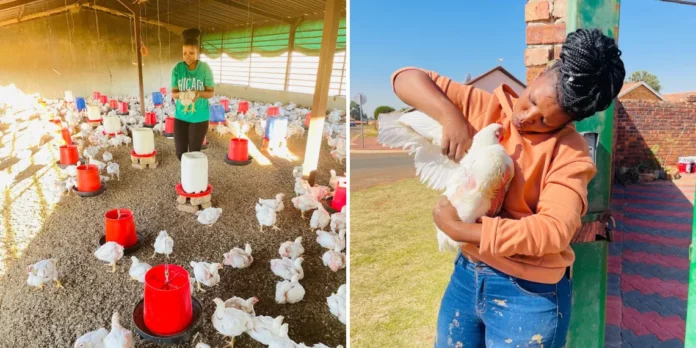Just one year after venturing into poultry farming, Ntobeko Vilakazi, a South African farmer can look back and smile after experiencing success in the highly explored sector.
On her farm in Ekangala, Mpumalanga, the farmer began her poultry farming journey with 50 broiler chicks which have since multiplied.
The proud owner of Luminathi Agribusiness and Projects Pty Ltd says chicken farming is demanding especially during the first days of the birds’ lives.
“Caring for chicks is much like taking care of a baby,” she told Food For Mzansi.
The farmer has adopted a daily routine to ensure the birds are healthy and comfortable for maximum production. Every morning, she ensures the chickens are well-fed with starter feed and fresh water.
With each feeder filled, she turns to sweeping and disinfecting the coop, and scrubbing down feeders and water containers until everything is spotless.
How do I survive on Sh. 12,000 salary and two baby mamas?
The farmer then monitors the chicks’ health, looking for any signs of illness or stress, before shifting the focus to maintaining ventilation, temperature, and hydration.
Around midday, Vilakazi and her team observe the chicks’ behaviour for any potential issues.
“In the evening, we repeat the feeding and secure the coop doors and windows to protect the birds,” Vilakazi adds.
The farmer notes that one of the challenges she faced in her venture is chicken diseases which swept her entire flock in 2023.
She however persevered and invested in education by studying livestock production at Buhle Farmer’s Academy. She also picked up some short courses in business management and permaculture at Tshwane University of Technology.
To mitigate diseases, she limits access to the coop noting that young birds are the most vulnerable to diseases.
“I’m very strict about biosecurity,” she says. “Only my worker and I are allowed inside until the birds reach six weeks.”
Currently with 150 birds, Vilakazi plans to grow her flock to 1 100 chickens. She also plans to add an animal health course to her studies to expand her business.
The farmer has a good market in the informal markets in Ekangala and nearby communities where she sells the chickens live or processed depending on customer preferences.
“When I started, I used to slaughter at home with the help of my family. Now, I use the abattoir since the business has grown, and my operations have evolved as well,” She said.








